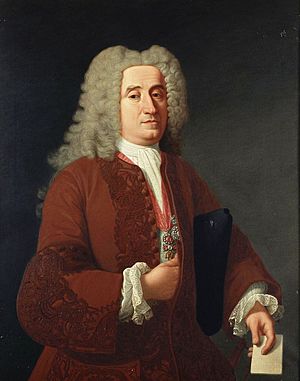José Patiño facts for kids
Quick facts for kids
The Most Excellent
José Patiño
|
|
|---|---|
 |
|
| Prime Minister of Spain | |
| In office 21 November 1734 – 3 November 1736 |
|
| Monarch | Philip V |
| Preceded by | The Marquess of the Peace |
| Succeeded by | The Marquis of Villarías |
| Personal details | |
| Born |
José Patiño y Rosales
|
| Nationality | Spanish |
José Patiño y Rosales (born April 11, 1666 – died November 3, 1736) was an important Spanish government official. He worked as the top minister, called the First Secretary of State, for Spain from 1734 to 1736.
Contents
José Patiño's Early Life
José Patiño was born in Milan, a city that was part of Spain at the time. His father, Don Lucas Patiño de Ibarra, was a respected government official. He worked for the King of Spain in Milan. José's mother was Beatrice de Rosales y Facini.
The Patiño family strongly supported the House of Bourbon, the royal family of Spain. José's older brother, Baltasar, became a well-known diplomat. José himself was first meant to become a priest. However, he chose a career in government instead.
Starting His Government Career
In 1700, when Philip V became king, José Patiño was given a position in the government of Milan. But when Spain lost control of Milan, he moved to Spain. In 1707, he joined a group that managed military orders.
During the War of the Spanish Succession, Patiño served as an intendant. This was a role similar to a governor or manager. He worked in Extremadura and then in Catalonia from 1711 to 1718.
In 1717, Patiño was put in charge of the navy. He helped reorganize it, making it stronger and more like the French navy. He was very capable and worked hard. This earned him the approval of Giulio Alberoni, another important minister. Patiño's education in Italy also helped him in his career.
A Key Leader in Spain
Patiño was worried about Spain's foreign policy, especially the risky plans of King Philip V and Queen Elisabeth Farnese. He believed these plans would lead to problems. However, as a public servant, he had to follow orders. He played a key role in organizing military trips to Sardinia, Sicily, and Ceuta between 1718 and 1720.
He became known to the King and Queen in 1720. At that time, he was helping to manage the difficult military actions against French troops near Navarre. This was during the War of the Quadruple Alliance.
Becoming Prime Minister
It wasn't until 1726 that King Philip V fully trusted Patiño. José and his brother, the Marquis of Castelar, were key opponents of a minister named John William, Baron Ripperda. After Ripperda's fall from power, Patiño was given important roles. He became secretary for the navy, for the colonies (called the Indies), and for foreign affairs. Later, he also took charge of the war office.
From May 13, 1726, until his death, José Patiño was effectively the prime minister of Spain.
Important Negotiations and Wars
During his time as prime minister, Patiño worked hard on talks with England. These talks were about disagreements over trade and colonies in America. These issues later led to a conflict called the War of Jenkins' Ear in 1739, after Patiño had passed away.
In 1735, he also started a war with Portugal. This war, known as the Spanish–Portuguese War (1735–37), aimed to take back a region in South America called the Banda Oriental from the Portuguese.
José Patiño died on November 3, 1736. He was a very important figure in Spanish history, helping to shape the country's government and foreign policy during a crucial period.
See also
 In Spanish: José Patiño Rosales para niños
In Spanish: José Patiño Rosales para niños
 | Percy Lavon Julian |
 | Katherine Johnson |
 | George Washington Carver |
 | Annie Easley |

